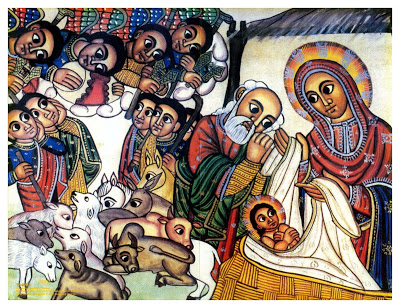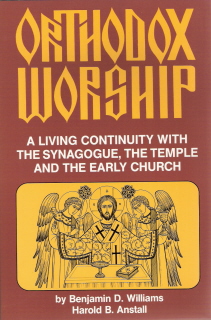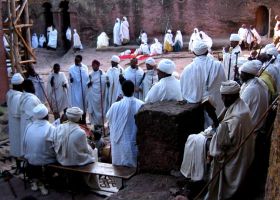- Jan 25, 2009
- 19,765
- 1,428
- Faith
- Oriental Orthodox
- Marital Status
- Private
- Politics
- US-Others
GG SSSS Shalom Everyone  .....
.....

Concerning why I was writing this, one of my dear brothers in the Lord once shared how the ways that icons/symbolism are done within Judaism is similar and yet distict from how they occur within Orthodoxy---as seen in #19 from the thread entitled Symbols in Judaism versus Icons in Christianity. What is the difference... .. ....and elsewhere amongst brothers/sisters in Messianic Judaism, there was discussion on how the Ethopian Orthodox church is very similar to Jews today in Judaism when it comes to their views on the Law and how they practice differing aspects within Judaism...as seen in the thread entitled Messianic Judaism and Ethiopian Orthodoxy ( specifically in #24 , on how the Ethopian Orthodox Church has been supported by Judaism in supporting Torah on many points ). One poster brought up how the Ethiopian Orthodox already don't eat pork, circumscize, often worship on Saturday (or both), follow OT laws on menstration, and do many other things in line with a Torah observant lifestyle. Some of it gets interesting when considering how many have even noted that things such as the Ark of the Covenant is held by Ethopia---as seen here:
Henry Louis Gates, one of the best black scholars/historians around, actually did a documentary on the issue with PBS, as seen here and here. And for other interesting documentaries on Ethopian Orthodox Christianity...
From what I've been able to observe over the years, there've been MANY Messianic Jews who've found the world of Orthodoxy to be one of the best expressions for what they feel the Jewish culture was centered around. When it comes to Eastern Orthodoxy or Oriental Orthodxy (i.e. Coptic, Ethopian, Syrian, Indian, etc), I've met/dialouged with PLENTY who are some of the most loving, caring and informed people I've ever witnessed...and I've learned much from them over the years. The Eastern Mindset toward spirituality is something that is often missed in the Western world---and much of it is often directly in line with how early Jewish culture would've operated. As is it, there are many coming from a Hasidic Jewish background that end up going into the liturgical circles of Orthodoxy (as well as Catholisicm) because of the fact that they feel it seems more similar to how the early church would've operated. On where more was shared on the issue, one can go here to #33.
As a former monk of the Eastern Orthodox Church
There was actually a book I was able to read on the subject that was very beautiful in content. It was recommended to me by the rabbi of the Messianic Jewish fellowship I attend ---known as Congregation Miskan David and Mivdad Shem Hakodesh---as he was a former monk of the Eastern Orthodox Church for a good bit---and the name of the book he gave me is entitled "Orthodox Worship: A Living Continuity With the Temple, the Synagogue and the Early Church" ( ).

With that said, I was curious as to what the thoughts of others were as it concerns discussion on which specific branch of Orthodoxy/Ancient Christianity seems to be the most similar in regards to what 1st century Judaism was like....and why that'd be the case. I know that there've been many battles between those who are for Ethopian/Oriental Orthodoxy and those within Eastern Orthodoxy over a host of issues, though I'm also aware that there has been reconcilliation at many points when it comes to certain points---and for some, its not so much a "contest" between which one represents Ancient Judaism better as much as its a discussion about where each of them represent differing aspects of the Jewish worldview/ministry.


Concerning why I was writing this, one of my dear brothers in the Lord once shared how the ways that icons/symbolism are done within Judaism is similar and yet distict from how they occur within Orthodoxy---as seen in #19 from the thread entitled Symbols in Judaism versus Icons in Christianity. What is the difference... .. ....and elsewhere amongst brothers/sisters in Messianic Judaism, there was discussion on how the Ethopian Orthodox church is very similar to Jews today in Judaism when it comes to their views on the Law and how they practice differing aspects within Judaism...as seen in the thread entitled Messianic Judaism and Ethiopian Orthodoxy ( specifically in #24 , on how the Ethopian Orthodox Church has been supported by Judaism in supporting Torah on many points ). One poster brought up how the Ethiopian Orthodox already don't eat pork, circumscize, often worship on Saturday (or both), follow OT laws on menstration, and do many other things in line with a Torah observant lifestyle. Some of it gets interesting when considering how many have even noted that things such as the Ark of the Covenant is held by Ethopia---as seen here:
Ethiopian Orthodox church has Ark of Covenant PART 1.
Ethiopia - The Ark of the Covenant 1-5
Digging For Truth - The Ark of Covenant
Ethiopia - The Ark of the Covenant 1-5
Digging For Truth - The Ark of Covenant
Henry Louis Gates, one of the best black scholars/historians around, actually did a documentary on the issue with PBS, as seen here and here. And for other interesting documentaries on Ethopian Orthodox Christianity...
From what I've been able to observe over the years, there've been MANY Messianic Jews who've found the world of Orthodoxy to be one of the best expressions for what they feel the Jewish culture was centered around. When it comes to Eastern Orthodoxy or Oriental Orthodxy (i.e. Coptic, Ethopian, Syrian, Indian, etc), I've met/dialouged with PLENTY who are some of the most loving, caring and informed people I've ever witnessed...and I've learned much from them over the years. The Eastern Mindset toward spirituality is something that is often missed in the Western world---and much of it is often directly in line with how early Jewish culture would've operated. As is it, there are many coming from a Hasidic Jewish background that end up going into the liturgical circles of Orthodoxy (as well as Catholisicm) because of the fact that they feel it seems more similar to how the early church would've operated. On where more was shared on the issue, one can go here to #33.
As a former monk of the Eastern Orthodox Church
There was actually a book I was able to read on the subject that was very beautiful in content. It was recommended to me by the rabbi of the Messianic Jewish fellowship I attend ---known as Congregation Miskan David and Mivdad Shem Hakodesh---as he was a former monk of the Eastern Orthodox Church for a good bit---and the name of the book he gave me is entitled "Orthodox Worship: A Living Continuity With the Temple, the Synagogue and the Early Church" ( ).

With that said, I was curious as to what the thoughts of others were as it concerns discussion on which specific branch of Orthodoxy/Ancient Christianity seems to be the most similar in regards to what 1st century Judaism was like....and why that'd be the case. I know that there've been many battles between those who are for Ethopian/Oriental Orthodoxy and those within Eastern Orthodoxy over a host of issues, though I'm also aware that there has been reconcilliation at many points when it comes to certain points---and for some, its not so much a "contest" between which one represents Ancient Judaism better as much as its a discussion about where each of them represent differing aspects of the Jewish worldview/ministry.

Last edited:
